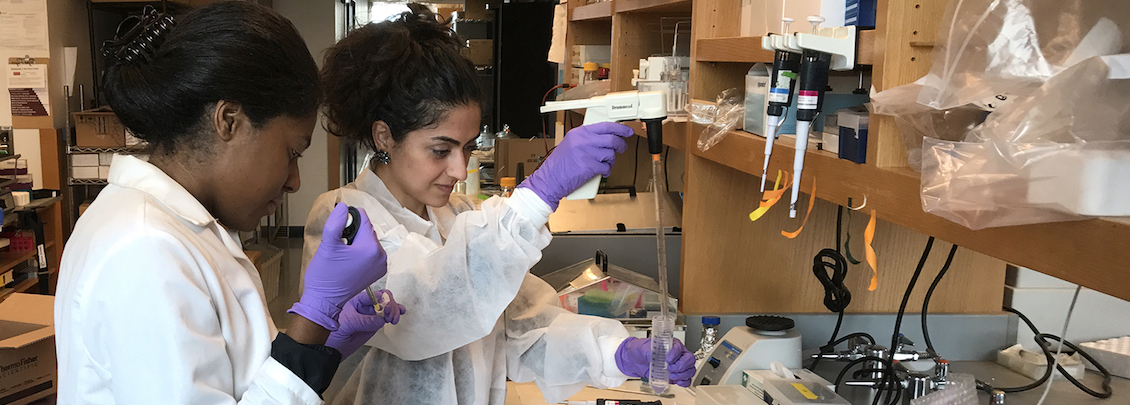Master’s in Nutrition and Metabolism
 1 year | full-time
1 year | full-time
2 years | full-time or part-time
boston university medical campus
- Nutrition and Metabolism – an interdisciplinary graduate program that focuses on the relationships between nutrition, biology, biochemistry, health, and disease.
- Prepares graduates for higher education in medicine, dentistry, and doctoral programs as well as careers in clinical, epidemiologic, AND laboratory-based research.
- This program meets the new registration requirements for graduate education for those with an undergraduate degree in nutrition and dietetics who are planning to take the national practice exam (of the Commission of Dietetics Registration).
Biochemical / Molecular Nutrition Research
You may choose to focus your studies on biochemical and molecular nutrition. In this track, you will investigate the role of basic biological processes as determinants of health and disease. In addition to our required interdisciplinary core coursework, you will need to complete 12 elective credits such as biochemistry, cancer biology, neuroscience, etc
Human Nutrition Research
You may also choose to focus your studies on clinical or epidemiologic research. In this focus area, you will study the role of nutrition in human health and disease. In addition to completing the interdisciplinary core coursework, students in the Human Nutrition Research track will complete their elective courses and research in disciplines such as nutritional epidemiology, psychosocial research, biostatistical analysis, and studies of diseases and disorders such as obesity, cardiovascular disease, diabetes, and cancer.
- Study and carry out research under the guidance of a world-renowned faculty
Program Highlights
- Study nutritional and metabolic aspects of obesity, diabetes, heart disease, cancer, bone health, and more
- Small class sizes
- Personalized mentoring to support each student’s success
- Publish your research in a peer-reviewed journal
Why choose the Nutrition & Metabolism Master’s Program?
Graduate degree from Graduate Medical Sciences at the Boston University Chobanian & Avedisian School of Medicine: The BU Medical Campus houses the Graduate School, the Chobanian & Avedisian School of Medicine, Boston Medical Center, and the Goldman School of Dental Medicine. It provides a diverse campus for academic and professional growth for pre-medical, pre-dental, and pre-doctoral students.
Located in Boston: Boston is a vibrant city, rich in history, the arts, sports, medicine, and education.
Rigorous, graduate-level curriculum: Students take a rigorous 32 credit curriculum (28 course credits and at least 4 research credits) and conduct original research under the guidance of a faculty mentor. Students write and defend thesis based on their original research and have the opportunity to co-author scientific papers.
Strong Advising, Career Mentoring: For some, the masters degree is a stepping stone for admission to medical school, dental school, or a doctoral program. For others, it leads to direct entry into the work force as a research scientist or in other related fields.
Program Duration: The duration of the program is flexible. Most students take 1.5 – 2 years and complete the coursework in the first year followed by placement in a basic, clinical, or epidemiologic research lab. If necessary, the program can be completed in 12 months (1 calendar year). Part-time options are also available as well.
World-class Resources: Students will have access to many world-class resources including the the Clinical and Translational Sciences Institute, the Cancer Center, and the Whitaker Cardiovascular Institute.
Learning Objectives
Nutrition and metabolism is a field of biomedical science where individuals apply knowledge of basic biology and chemistry to better understand how the body uses energy and nutrients in food, and the impact that this can have on health and disease.
The program’s interdisciplinary curriculum, which includes physiology, biochemistry, molecular biology, genetics, clinical nutrition research and epidemiology, provides students with a broad knowledge of the biomedical sciences. This knowledge is critical given the rapid pace with which science is currently advancing. In addition to learning essential principles of nutrition and metabolism, students develop the critical thinking skills needed to understand and evaluate biomedical research literature and to participate in carrying it out.
- Understand the scientific basis for nutrient requirements
- Demonstrate ability to assess relevant scientific literature and synthesize existing knowledge in nutrition and metabolism with new research information.
- Understand the molecular, cellular, biochemical, physiological and behavioral mechanisms that influence nutrient utilization, food intake and energy balance
- Understand the mechanistic connections of nutrient status to health and disease
- Demonstrate the ability to communicate your knowledge of the field of nutrition and metabolism through effective presentation and writing skills
Career Outcomes
- Professional degree: medicine, dentistry veterinary medicine, nutrition & dietetics
- Doctoral studies in biomedical sciences, epidemiology, public health, etc.
- Research scientist in industry (biotechnology, pharmaceutical, food science, or nutraceutical industries)
- Registered dietitian or nutritionist
- Researcher in academics
- Laboratory management, product management, research analyst
- Medical writer, scientific writer
- Project director or coordinator for nutrition-related clinical or epidemiologic studies
- Research or program management for government, nonprofit, or community-based health and wellness programs
Living in Boston
Boston University’s Chobanian & Avedisian School of Medicine and Boston Medical Center are in the heart of Boston’s diverse and thriving South End community. Boston is an exciting city that is home to more than 35 colleges and universities and 250,000 students. It is a student-centered city with a rich history, many cultural activities, and sports teams with a passionate fanbase.
Boston has more than 1,100 acres of interconnected green space with numerous parks, walking paths, and areas to jog, bike, sail or row. The city has a wonderful mix of history, nature, and educational pursuits.
Contact Us
Program Director, Dr. Lynn Moore
Associate Director: Dr. Jude Deeney
Program Administrator, Marika Groussis
Address:
72 East Concord Street
Instructional Building, L5
Boston, MA 02118

